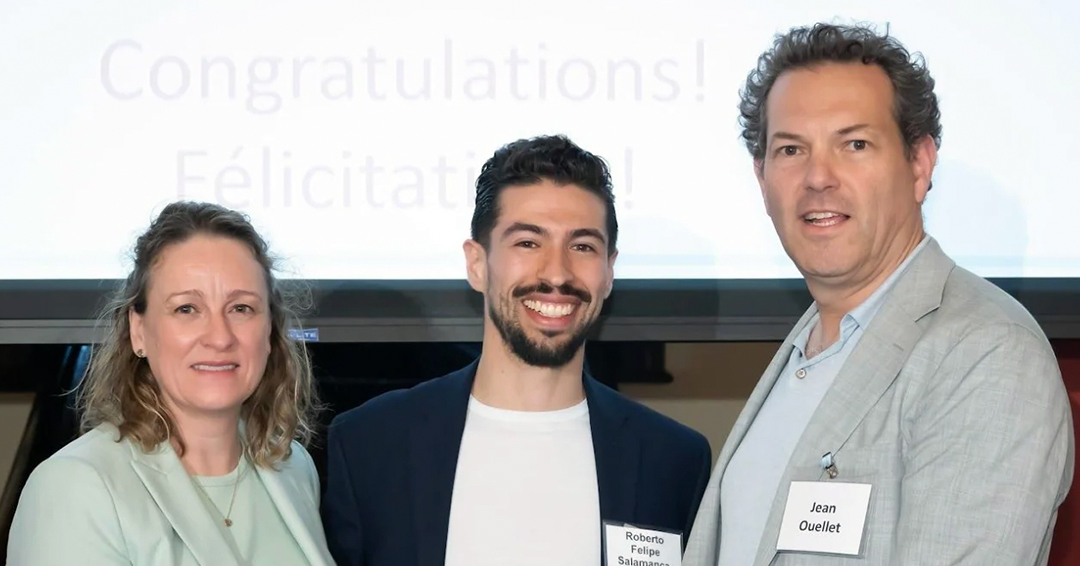
Winning innovations aim to help children regain motor function; reduce pain in women’s health care
While training as a neuroscientist, Roberto Felipe Salamanca-Giron worked with Emma, a young girl with cerebral palsy whose fierce spirit left a lasting impression.
“She used to tell me, ‘What I really crave is independence,’” he said. “The best way to give that was by helping her get out of the confinement of a wheelchair.”
That moment became the spark for PhantasiAI, an AI-powered tool designed to eradicate children’s paralysis caused by cerebral palsy, stroke or spinal cord injuries.
Salamanca-Giron’s start-up is one of seven companies that won prizes at the McGill Clinical Innovation Competition (CLIC) this spring.
Hosted by the McGill’s Faculty of Medicine and Health Sciences’ Steinberg Centre for Simulation and Interactive Learning, CLIC supports members of its community in turning promising health care ideas into real-world solutions, offering funding, mentorship and clinical access.
AI-driven neurorehabilitation for kids
PhantasiAI’s prototype uses neurostimulation to rewire the nervous system without surgery or implants.
“What’s really new here is the adoption of AI,” said Salamanca-Giron, a McGill alumnus and postdoctoral entrepreneur at Mila – Quebec Artificial Intelligence Institute.
Because every child’s condition and objectives are different, stimulation needs to be tailored, he added.
“The best analogy is music. Some people tune to hard rock or classical music, because these are completely different in terms of tempo, intensity and rhythm. It’s the same with stimulation. We use AI algorithms to determine the best way to orchestrate stimulation for each person in real time.”
As a winner of the Pediatrics Clinical Innovation Prize, he received $4,000 with the chance to unlock up to $16,000 in matching funds. He is piloting a feasibility study at Sainte-Justine Pediatric Hospital this fall and setting a clinical collaboration with Marie-Hélène Boudrias, associate professor in McGill’s School of Physical and Occupational Therapy.

For fellow CLIC winners Claire Phan and Julie Bertucceli, winners of the Smart & Biggar Innovation Prize: Clinical Innovation with the Most Promising Commercial Value Proposition, first-hand experience with a painful procedure sparked a drive to improve women’s health care.
They co-founded MiniGyn to redesign one of gynecology’s oldest tools and make intrauterine device (IUD) insertion – a common method of long-term birth control – less painful.
“During an IUD insertion, a clamp is used to stabilize the cervix,” said Phan. “The current tool often causes bleeding and trauma. We want to create a version that still stabilizes the cervix but is far less traumatic.”
The two met while working on an engineering master’s project. Claire was enrolled in Surgical Innovation, a joint program run by McGill, École de technologie supérieure and Concordia University, while Julie completed her degree at Université du Québec à Chicoutimi.
“This is about empowering women,” added Bertucceli. “When we asked women about their IUD experience, they often had no idea what tools were used or what was done. If our project gets people talking, it can help women better understand their care and advocate for better treatment.”
MiniGyn received $5,000. Phan and Bertucceli are preparing to file a patent and further develop the prototype with support from the CLIC prize.
For the full list of 2025 winners and more information about the competition, visit the CLIC website.
